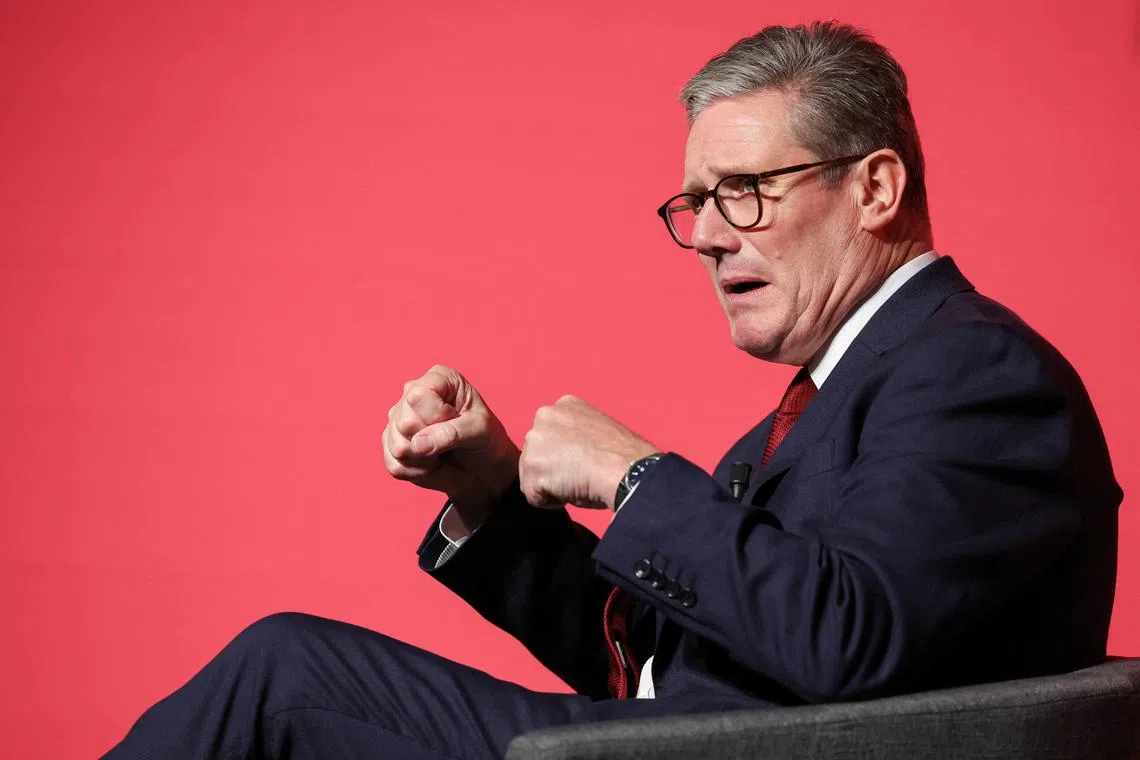Starmer set to make ‘tough long-term decisions’ for Britain’s renewal
Sign up now: Get ST's newsletters delivered to your inbox

British Prime Minister Keir Starmer has been criticised for seeming to be too downbeat about Britain's economy.
PHOTO: REUTERS
LIVERPOOL - British Prime Minister Keir Starmer said on Sept 24 he would make “tough long-term decisions” to reform Britain and fix the country’s public finances, as he addressed Labour’s annual conference for the first time since his party swept to power
“I understand many of the decisions we must take will be unpopular,” Mr Starmer told delegates in Liverpool. “First, we stabilise our economy; second, we fix the foundations; and, third, we build with pride and determination a Britain that belongs to you.”
Mr Starmer’s conference speech – which combined lofty rhetoric about his hopes for Britain along with warnings about difficult choices ahead – came as he tries to re-inject momentum into his administration after suffering a series of early setbacks
Mr Starmer reiterated his message about a dire inheritance left by the previous Conservative government, but also tried to paint a more optimistic view of the country’s prospects.
He repeatedly said the “work of change has begun”, and that his government was committed to national renewal.
That hint of a more optimistic tone came after he and Chancellor of the Exchequer Rachel Reeves were accused of being too downbeat about Britain’s economy and public finances, a gloominess that has coincided with a dip in consumer confidence and warnings from businesses that raising taxes in the Oct 30 Budget will undermine growth.
It has all made for an uncomfortable backdrop for Mr Starmer, whose popularity has slumped along with his party’s.
An Opinium survey found Mr Starmer polling less favourably than his predecessor, Mr Rishi Sunak, while an Ipsos survey showed six in 10 Britons were unhappy with the Labour government.
On Sept 23, Ms Reeves tried to project a more positive vision for the country, promising a budget that would show “real ambition” to deliver growth.
“I can see the prize on offer if we make the right choices now,” she said.
Tough decisions ahead
But Mr Starmer also warned off tough decisions looming to fix the £22 billion (S$38 billion) hole in the public finances Labour said it has inherited from the Tories.
“As we take on those massive challenges the Tories ignored, the time is long overdue for politicians to level with you about the trade-offs this country faces,” he said. “Because if the last few years have shown us anything, it’s that if you bury your head because things are difficult, your country goes backwards.”
In other parts of his speech, Mr Starmer also addressed the riots that hit Britain over the summer.
“I will never let a minority of violent, racist, thugs terrorise our communities,” he said.
He also said he was committed to “control” of migration, and understood voters’ concern about it.
Mr Starmer said he would reform apprenticeships and “rebalance funding in our training system back to young people”.
But he also committed an awkward gaffe when he urged peace in the Middle East. As he called for the release of hostages in Gaza, he first referred to them as “sausages” before immediately correcting himself. BLOOMBERG


